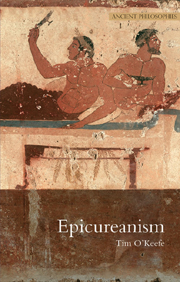Book contents
- Frontmatter
- Contents
- Preface
- Acknowledgements
- Sources and abbreviations
- Chronology
- 1 Introduction: the life of Epicurus and the history of Epicureanism
- I Metaphysics and physics: introduction and overview
- II Epistemology: introduction and overview
- III Ethics: introduction and overview
- Glossary of terms
- Notes
- Further reading
- Bibliography
- Index
I - Metaphysics and physics: introduction and overview
- Frontmatter
- Contents
- Preface
- Acknowledgements
- Sources and abbreviations
- Chronology
- 1 Introduction: the life of Epicurus and the history of Epicureanism
- I Metaphysics and physics: introduction and overview
- II Epistemology: introduction and overview
- III Ethics: introduction and overview
- Glossary of terms
- Notes
- Further reading
- Bibliography
- Index
Summary
Epicurus divides philosophy into three parts: physics, “canonic” and ethics (DL X 29–30). Canonic deals with the standards used to judge what is the case (which in contemporary philosophy falls under the heading “epistemology”), and ethics with what to pursue, what to avoid and what the goal of human life is. These parts of the system will be explored later in the book.
Epicurean “physics” covers the entire theory of nature (phusis in Greek, from which “physics” is derived): what the basic constituents of the natural world are and how one explains the processes within it. So Epicurean “physics” covers much of the same ground as does contemporary physics, for example in its theorizing about the types of atomic motion and how atoms form larger bodies, and in its cosmology. However, it extends considerably further. Since it concerns change in the natural world as a whole, biological questions (such as how one explains the apparent functional organization of creatures' organs) and psychological questions (such as how one accounts for vision) also fall under the purview of Epicurean “physics”. Furthermore, Epicurus thinks that the natural world is all that exists, so Epicurean “physics” is really a general theory of what exists and what its nature is. Thus, Epicurean “physics” addresses issues that many (although not all) philosophers would think are more properly metaphysical and not scientific: what the relationship of the mind to the body is and whether there is an afterlife; whether the gods exist and, if they do, what they are like; and whether only material things exist as such.
- Type
- Chapter
- Information
- Epicureanism , pp. 11 - 14Publisher: Acumen PublishingPrint publication year: 2009



